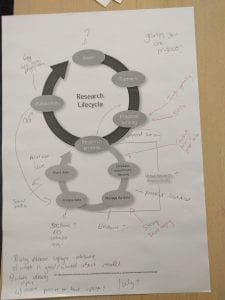How can library staff support Research Data Management?
By ucyldva, on 4 August 2017
The Research Data Management (RDM) team recently ran two training sessions on RDM aimed at library staff. The first of these sessions was aimed at subject liaison librarians. The second was organised by Angela Young as part of the series the Summer School and was primarily aimed at library staff working in biomedical libraries.
Both sessions aimed to provide an introduction (or reminder) of the aims behind RDM, the services available at UCL to support researchers and to discuss how library staff can support RDM. As part of our ongoing work to develop the services we offer to support researchers with RDM, we are trying to increase the amount of subject specific resources and guidance available. Different disciplines can have very different types of data, different approaches to working with data or a perception that they don’t work with data. Working with colleagues in the library who support researchers across the disciples represented at UCL should help us develop better support for researches.
As part of both of the sessions, we had a number of different exercises. One of the exercises involved mapping out the interactions library staff and services have with researchers at different stages of the research lifecycle. We asked participants to work in groups to discuss whether the lifecycles accurately reflected the research process and decide on their preferred model. We then asked participants to annotate their chosen lifecycle with points where they may have interactions with researchers.
 One of the challenges for the RDM team is trying to engage researchers earlier in their research process so we can help advocate for good practices in storing and collecting data which in turn makes data sharing easier at the end of a project. Mapping out the lifecycles with colleagues from the library gave us useful insights into where potential opportunities may be available for RDM advocacy. During the sessions, we also discussed how existing activities carried out by library staff (training, open access advocacy, signposting, research support…) and the existing skills of library staff can complement RDM advocacy.
One of the challenges for the RDM team is trying to engage researchers earlier in their research process so we can help advocate for good practices in storing and collecting data which in turn makes data sharing easier at the end of a project. Mapping out the lifecycles with colleagues from the library gave us useful insights into where potential opportunities may be available for RDM advocacy. During the sessions, we also discussed how existing activities carried out by library staff (training, open access advocacy, signposting, research support…) and the existing skills of library staff can complement RDM advocacy.
We are planning to collate the research lifecycles produced during the sessions and turn it into a resource for us to use when planning advocacy. If you are interested in contributing to developing a lifecycle model with us send an email to lib-academicsupport@ucl.ac.uk.
Leave a Reply
You must be logged in to post a comment.
 Close
Close

